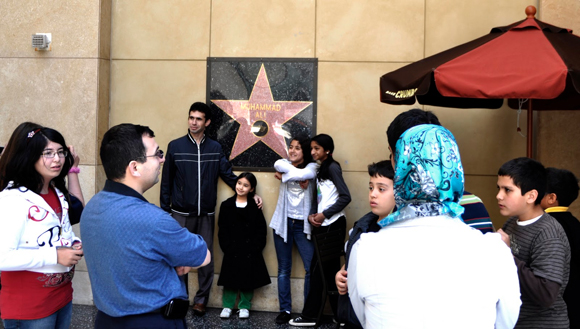Boxing legend Muhammad Ali who passed away yesterday after a 32-year battle with Parkinson's disease, is in fact the only star' situated on a wall at Hollywood Walk of Fame and not the floor.
The Hollywood Walk of Fame comprises more than 2,500 five-pointed terrazzo and brass stars embedded in the sidewalks along 15 blocks of Hollywood Boulevard and three blocks of Vine Street in Hollywood, California.
The stars are permanent public monuments to achievement in the entertainment industry, bearing the names of a mix of actors, musicians, directors, producers, musical and theatrical groups, fictional characters, and others. The Walk of Fame is administered by the Hollywood Chamber of Commerce and maintained by the self-financing Hollywood Historic Trust. It is a popular tourist destination, with a reported 10 million visitors in 2003.
When Muhammad Ali was offered a star with his name on this Walk of Fame' he refused and said: “I bear the name of our honourable Prophet Muhammad (peace be upon him), and it is impossible that I allow people to trample on his name."
Muhammad Ali's star was granted after the committee decided that boxing could be considered a form of "live performance". Its placement, on a wall of the Dolby Theatre, makes it the only star mounted on a vertical surface, acceding to the legend's request that his name not be walked upon.
After accepting Islam decades ago, Muhammad Ali had motivated thousands of American Christians to embrace Islam. Mr Ali, who was called by Americans and the global fans as “the greatest”, had openly proclaimed that “Allah is the Greatest. We are just human beings.”











Comments
A man of true faith, RIP
See the respect for Islam on the height.....not on the floor..............
Great Muhammad Ali, he understood islam and came to the relegion of peace and see the respect of the name \Muhammad\" today where it is."
The legend of Legends,great human being,My heartfelt condolences,May Allah grant him Jannatul Firdouse
GREAT PERSON WIL SHOW GREAT, HE IS LUCKY GUY HE CONVERTED TO ISLAM ..
Add new comment